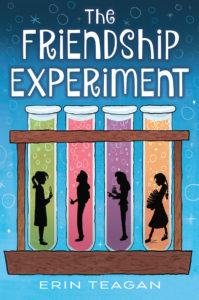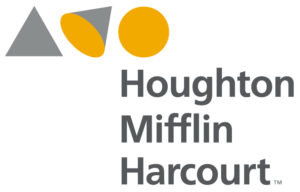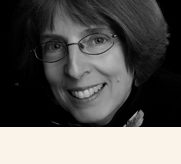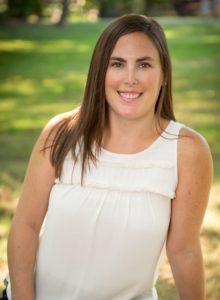 I don’t remember exactly when I met Erin Teagan, but I know it was through SCBWI‘s Mid-Atlantic chapter—either the annual fall conference or the novel revision retreat. It might’ve been as many as ten years ago, so in 2015 when I heard Erin’s debut novel had sold to Houghton Mifflin Harcourt, I did a happy dance!
I don’t remember exactly when I met Erin Teagan, but I know it was through SCBWI‘s Mid-Atlantic chapter—either the annual fall conference or the novel revision retreat. It might’ve been as many as ten years ago, so in 2015 when I heard Erin’s debut novel had sold to Houghton Mifflin Harcourt, I did a happy dance!
The Friendship Experiment is a heart-felt middle-grade novel about a 6th grader who loves science and could use some help in the friendship department. It hit shelves in late 2016, and this month I caught up with Erin to ask about her writing process.
A.B. Westrick: Congratulations, Erin! And welcome to my blog.
Erin Teagan: Thank you, Anne!
ABW: I want to start by asking about you. Your bio says you’re a former research scientist. How much of you is present in your protagonist, Maddie, and how much of Maddie is pure fiction? Tell us a little about your process in crafting this delightful character.
ET: The idea of Maddie came to me when I was working for a biologics company and I took my mug to the dishwasher and found that a scientist had posted a very official and detailed standard operating procedure on how to use this everyday appliance. I immediately thought about this scientist’s life. Did he write SOPs and put them on his appliances at home? Did his kids have an SOP taped to their bathroom mirror to help them brush their teeth? This is how Maddie came to me.
ABW: Hahaha. Makes me think about the little notes I post at my house. But mine aren’t SOPs! They’re more like labels on leftovers so I don’t leave them to rot in the fridge. But back to Maddie. Say more about crafting her…
ET: When I was Maddie’s age, I wanted to be a writer. I didn’t even realize how fun and cool science could be until I went to high school and met a real scientist and spent a day with her on the job. Maddie’s love of science and exploring and discovering things is a quality I wish I had when I was a kid.
ABW: What about Von Willebrand disease, the blood disorder that plays a role in this story? How did you come to write about that?
ET: Full disclosure, I am terrified of blood and have a tendency to pass out when faced with anything gruesome. It runs in my family! I did not share this in my interview at the National Institutes of Health when I applied and ultimately got a job as a researcher in their hematology lab.
ABW: You’re like that British sitcom doctor—Doc Martin—who turns green when he has to draw blood.
ET: Yes! And I ended up working with blood for ten months. I was researching Von Willebrand Disease, a fairly unknown blood disease, but quite prominent. I worked for a scientist who was also a doctor and in her research, she was trying to find a better way to diagnose patients. I thought about how difficult it would be to be a middle school girl with a bleeding disorder. I mean, as if dealing with middle school isn’t enough! I wanted to write a book for that girl.
ABW: Nice. And even though her disease was significant to the story, I’m glad you didn’t open with a bloody scene. (That would have set a totally different tone!) I’d love to hear how/why you decided to begin with the estate sale. In early drafts, was that scene always your opener, or did you experiment with other possible openings?
ET: I love estate sales. You can learn so much about a person by what they’re trying to get rid of. And how cool to see what an eccentric scientist might be selling! I pretty much had the estate sale as the opening scene from the beginning, although for the longest time, it was for a professor from the university and not Maddie’s grandfather. The storyline with the grandfather passing didn’t emerge until my fourth or fifth or seventeenth draft. And it was the storyline that really pulled everything together for me.
ABW: Oh, definitely. The Grandpa bits are crucial to the story. How interesting that he didn’t emerge until late in the process.
ET: Yes, and also, the toughest scenes for me to write were his scenes. I could tear up just thinking about him! Especially the bus scene—don’t even get me started. Letting Maddie feel the loss of Grandpa was the hardest part for me to write.
ABW: If his scenes were the toughest to write, what about the scenes where Maddie makes a mess of her friendships? Mid-way through, I was feeling pretty sorry for her. How hard was it for you to make things hard for Maddie?
ET: Oh man, it was so hard! Poor Maddie! I wanted to protect her from making the kind of mistakes that were making her life difficult. She is so stubborn. And clueless. But the great thing about being the author of her story is I knew she had to made these mistakes to grow as a friend.
ABW: Yes, so true. Now somewhere, I read that your initial title was Standard Operating Procedures. How did the title get changed to The Friendship Experiment?
 ET: When I signed with HMH, they let me know they wanted a title that was more accessible to kids. We threw a lot of ideas out and ultimately my editor’s amazing assistant came up with The Friendship Experiment. And we all loved it.
ET: When I signed with HMH, they let me know they wanted a title that was more accessible to kids. We threw a lot of ideas out and ultimately my editor’s amazing assistant came up with The Friendship Experiment. And we all loved it.
ABW: It’s a great title. And I loved reading the Author’s Note where you thanked your writing group. How does your group work? How do you support and encourage one another? How long did it take you to write The Friendship Experiment, and how involved was your group in your process?
ET: Oh, I adore my writing group. I feel so lucky to have them. There are six of us and we’ve met just about every Thursday night since 2005. I think our group works well because for one, everyone is dedicated to their writing no matter where they are in their careers, and secondly, we don’t require any preparation before our meetings. If you want something critiqued, you bring it with you, and we take a few minutes to read and make comments.
We always do NaNoWriMo together and The Friendship Experiment was my 2011 project. I wrote the first, terrible draft in a month, then spent the next two years rewriting and making sense of the story. My writers group was very involved in this process. I could bring the most obscure, not-sure-I-even-knew-what-I-was-asking kind of question about plot, and they could zero in on my problem and tell me how to fix it. They are amazing that way.
ABW: They are amazing! (I know everyone in your group.)
Got any final tidbits of advice for aspiring novelists?
ET: My advice to aspiring novelists is to try something new if you are in a slump. If you’re an outliner, try being a pantser for your next idea. If you’ve been working on the same project for ten years, put it aside and start something new. I made the greatest leaps in my writing when I pushed myself out of my comfort zone. Also, go to conferences and retreats—you will meet many supportive and kind authors (like Anne Westrick!).
ABW: Thank you so much for talking about your process, Erin, and all the best with your next book!
Readers: you can learn more about Erin Teagan on her website and find her on Twitter.


Hey, Anne.
A meaty interview. I like to read about process and the books’ background.
Erin has good suggestions – NaNoWriMo, conferences, a writing group that meets often.
Best,,
Lenore
Yes, and her suggestions are so do-able! I’ve never done NaNoWriMo, but might give it a try. I tend to write slowly, and with NaNoWriMo you don’t have that option. It could be good. But then again… November? Why November? (I just looked up why. Found the answer in the history: http://nanowrimo.org/history. Turns out they thought a bad-weather month conducive to writing. Hmmm.) Anyway, yes — great suggestions from Erin. Thanks for commenting, Lenore!
Hey again,
I’ve done NaNoWriMo twice. I found it helpful as a jumpstart. Probably 85-90% never made it into the finished ms. but the process keeps the brain fluid and shuts up the inner critic. It delivers a ton of ideas. Some great, some stupid. There is a lot to pick from. HA.
The first time I struggled to make the daily quota. I finished on the last day. The second time I finished a week early. I surprised myself. When the timing is right, I’ll do it again.
I’ve heard others say the same–that it’s less about content, more about process, getting a flow going, loosening up, shunning the critic. All good. Okay, maybe 2017 will be my year to give it a try.
I recall when you wrote that! Hope it goes well and wacky!
L.
This book sounds really fun.
I can’t help chuckling at that scientist’s note for the dishwasher. 🙂
The book is full of scenes at Grandpa’s house with notes everywhere. It’s funny at times, but poignant, too.